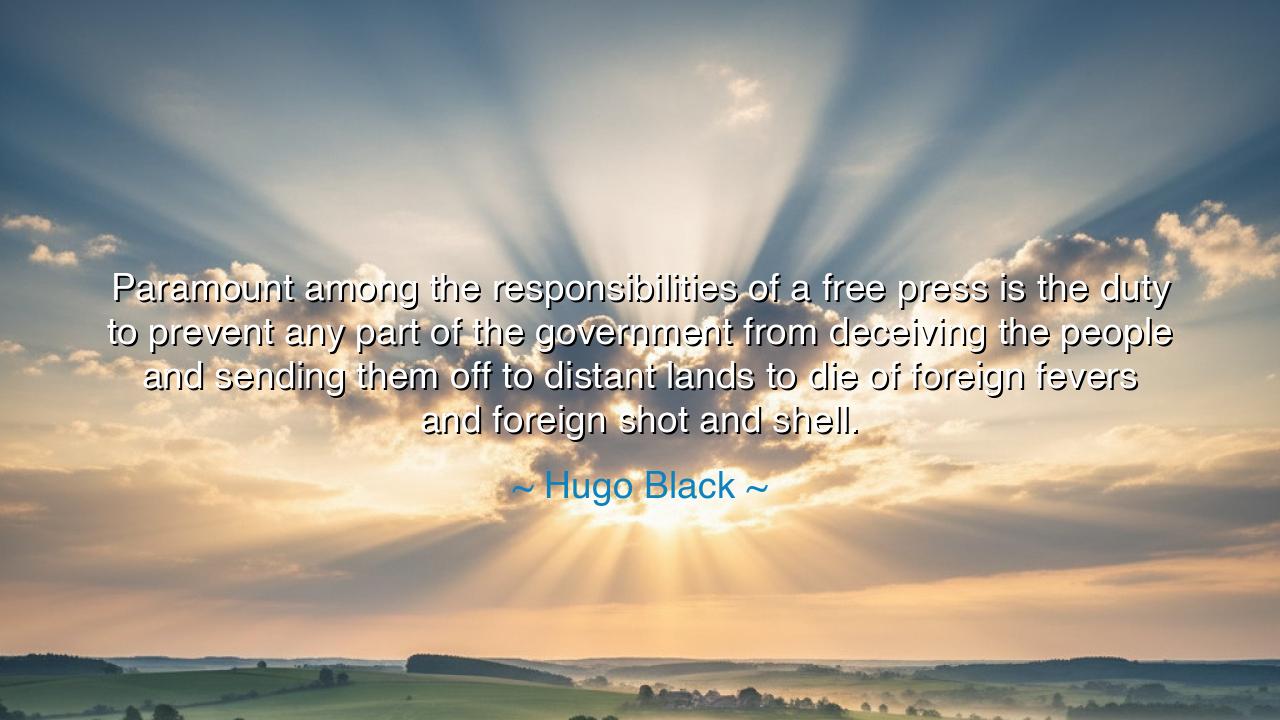
Paramount among the responsibilities of a free press is the duty
Paramount among the responsibilities of a free press is the duty to prevent any part of the government from deceiving the people and sending them off to distant lands to die of foreign fevers and foreign shot and shell.






When Justice Hugo Black declared, “Paramount among the responsibilities of a free press is the duty to prevent any part of the government from deceiving the people and sending them off to distant lands to die of foreign fevers and foreign shot and shell,” he was not speaking as a mere jurist — he was speaking as a guardian of truth, the ancient and eternal enemy of tyranny. His words burn with the fierce conviction that freedom of the press is not a privilege to flatter power, but a sacred duty to expose it. In these lines, uttered during one of the most turbulent chapters in modern American history, Hugo Black reminds us that truth is the armor of the people, and that without it, even the most noble republic can descend into the darkness of deceit.
The origin of this quote lies in the Pentagon Papers case of 1971, a monumental decision that tested the very soul of the First Amendment. During the Vietnam War, a series of secret government documents — revealing years of deception about the war’s progress and purpose — were leaked to The New York Times and The Washington Post. The government sought to silence these publications, claiming that national security was at stake. But Justice Black, standing firm like a sentinel of liberty, rejected that plea. He declared that the press must be free to tell the truth, even when — especially when — the truth exposes the government’s lies. For him, the Constitution’s protection of the press was not meant to comfort the powerful, but to protect the powerless from manipulation and ruin.
In ancient style, we might say that Hugo Black’s words were spoken from the mountain of moral law, echoing the voice of prophets and philosophers who warned that deception in war is the first step toward the death of freedom. For when governments cloak their actions in secrecy, when they send men and women to die “of foreign fevers and foreign shot and shell” under the banner of falsehood, they transform patriotism into tragedy. The people, deprived of truth, become soldiers of ignorance; their courage is spent not in defense of liberty, but in service to illusion. Justice Black saw this danger clearly — that a nation deceived is a nation enslaved, no matter how proudly it waves its flag.
The history of the twentieth century offers countless examples of the truth behind his warning. In the Vietnam War, the American government assured its citizens that victory was near, that progress was steady — all while knowing that the war was unwinnable. The lies, once exposed by journalists like Daniel Ellsberg and publications like The New York Times, shattered the illusion of moral clarity that had guided the nation. But this exposure, painful as it was, became an act of purification. It showed the world that the press, when faithful to its duty, is the conscience of democracy, the voice that dares to speak when others remain silent. Without that courage, the deception might have lasted another decade, and thousands more would have perished — victims not only of bullets, but of betrayal.
Yet Hugo Black’s message extends far beyond the wars of his time. It speaks to every age in which power seeks to control narrative, to sculpt reality itself. Governments, corporations, and even churches — the “faceless organizations,” as Simon Toyne once said — all share a temptation: to hide what is shameful, to bend truth into obedience. But the free press, when it remembers its purpose, stands as a torch in the shadows, illuminating what those in power wish to conceal. It is not a weapon of chaos, but a safeguard of civilization — for without truth, justice cannot breathe, and without justice, peace cannot endure.
The emotional depth of Black’s words lies in his understanding that truth is not comfortable; it is costly. To publish what the powerful would suppress often invites anger, punishment, even persecution. Yet, he believed that this sacrifice was the price of moral courage — that the blood spilled in silence is far greater than any wound suffered for the sake of truth. In this belief, he stood in the company of heroes: the philosophers who defied tyrants, the reformers who exposed corruption, and the journalists who risked all to awaken their fellow citizens. Theirs is the lineage of the truth-teller, whose loyalty lies not with government, but with conscience.
The lesson that Justice Black passes down to us is both solemn and urgent: a free people must guard the freedom of their press as fiercely as they guard their own lives. When the press is silenced, truth is buried; and when truth is buried, injustice reigns. Citizens must demand transparency, question authority, and defend those who speak truth to power, even when the truth discomforts them. For liberty is not lost in one blow, but in a thousand quiet concessions — when lies are tolerated, when secrecy is excused, when truth is postponed for convenience.
So let his words endure like a commandment to all generations: Never let power deceive you in the name of safety, nor let comfort quiet your hunger for truth. A free press is the armor of the people, and truth is the shield of civilization. Cherish it, protect it, and demand it — for when truth falls silent, nations march willingly into darkness, and freedom dies not with thunder, but with a whisper.






AAdministratorAdministrator
Welcome, honored guests. Please leave a comment, we will respond soon